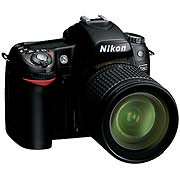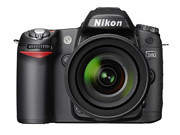
Despite a steady decline in online conversations about cameras as most tech buzz is about testing for kinks in Apple's armor (yawn), the hierarchy of camera manufacturers remains unchanged. As conversations move, they all move together with no one really making gains or losing ground.
When you look at the landscape, Canon and Nikon lead the pack, with Sony in the ball park (mostly because the general brand name gives it a boost). Somewhere on a lower plane are the next three: Olympus, Samsung, and Panasonic. It has been this way for some time, with Canon and Nikon as camera market share leaders.
The reason is pretty obvious. Nikon and Canon made an early push into social media, seeing the significance in an online world that loves photos. Olympus missed the window, and has been playing catch up for a year. It might take ten.
To do it, Olympus tapped Mullen to develop a 10-step solution for social media. I've listed the steps, but you can read the rationale on Mullen's 10-Step Social Media Plan For Olympus.
Mullen's 10-Step Social Media Plan For Olympus.
1. Make A Commitment.
2. Define The Community.
3. Determine Objectives.
4. Engineer A Presence.
5. Build A Following.
6. Inspire Participation.
7. Get Attention.
8. Mobilize Community.
9. Measure Results.
10. Keep going.
Yep. There are some critical elements missing. There are some steps patently out of order. And with the exception of a stated commitment, I don't understand why they are still going through the motions. It's a scripted tried-and-tired social media plan.
Unfortunately for some, social media is adaptive. In fact, about the only thing that hasn't changed is that social media skews toward front runners. Nobody likes that fact, but it makes sense. It's news when you launch the first social media campaign in an industry. It's not news when you launch the first campaign for a company.
So, how does this plan execute? Here we go.
The Latest Pitch For Olympus.
 The latest pitch for Olympus from Mullen is pretty standard fare. It consisted of a faux personalized hype e-mail about a "pretty awesome contest" that they call blogger outreach. Oh, golly gee. They told be about a contest and that it would be perfect for my creative-minded readers. Um, that would be you? And it might even be perfect for me. Ho hum. Not me. I get paid to do that stuff.
The latest pitch for Olympus from Mullen is pretty standard fare. It consisted of a faux personalized hype e-mail about a "pretty awesome contest" that they call blogger outreach. Oh, golly gee. They told be about a contest and that it would be perfect for my creative-minded readers. Um, that would be you? And it might even be perfect for me. Ho hum. Not me. I get paid to do that stuff.So here is the skinny minus the hype (and there is plenty of hype). You shoot a video (probably with a Flip or Sony or whatever) about what you would do if you had the new Olympus PEN E-PL1 and a $5,000 budget. Then upload it to YouTube. The pitch says that the Olympus community will pick the finalists. From those six, they receive an all-expense paid trip for two to New York, where whatever they shoot with the $5,000 budget will be displayed at the U.S. Open. Pretty simple.
A Few Areas Where Things Get Muddled.
Let's start with the contest voters. They say the community will judge it so it might make sense to know who this community might be.
Well, you won't find social media links on the Olympus Web site, but you can find a community of sorts. It would include 5,700 people on Facebook, 500 members on Flickr, 500 subscribers on YouTube, and 4,100 folks on Twitter. If we skew for multiple account holders, it might consist of 7,000 (some of whom know each other). Okay, it's small. If you're new, it's a disadvantage.
No worries. As it turns out, the Olympus community doesn't really pick the winners. Only the YouTube account holders vote. And those voters won't vote for 20 semi-finalists. They only influence who might make it the final six.
So how does it really work? The six finalists will be determined by judges based on creativity, quality, and contest theme. YouTube members will still get to vote, but their votes only count for 49 percent of the tally. The same goes for determining a finalist, except the finalist videos will be about what finalists did with the Olympus PEN E-PL1 and $5,000 budget. The finalists have about a month (maybe two or three weeks depending on how fast they get the camera) to complete for the prize.
If you poke around, you'll also discover that the community is young, with the number one question about the contest being tied to the age requirement. Most can't enter. What they don't ask about is the total prize, which includes two lenses, a stereo mic, extra battery, and camera bag for a estimated retail value of $6,200. That's not bad, along with $5,000 cash.
If you're wondering why there is an emphasis on the U.S. Open, a quick search reveals that Olympus is a sponsor. Otherwise, there is no connection to the contest.
Chances For A Social Media Win With This Contest.
While anything can happen online (sometimes marketers get lucky), the chances of Olympus gaining ground with this contest is marginal. Sure, Olympus cameras usually have an advantage for lightweight travel and stabilization built into the camera body, but Nikon and Canon dominate every other category, including the pro line, market share, ISO performance, and expandability.
But beyond that, the problems can be found in the approach. There are plenty, but we'll stick with the basics today.
1. Olympus started out of the social media gate slow because it entered the game so very, very late. But worse, it's relying on contests to introduce products to a community that just doesn't exist. Seriously, with the exception of huge brands, contests work better as an engagement tool than an introduction vehicle (unless the prize is HUGE or the community is established).
2. Olympus didn't compensate for the lack of community by leaning on the networks or communities where they participate. Specifically, this contest could receive a boost from three groups: YouTube members (assuming it's heavily promoted), amateur photographers (since pros have settled on Nikon or Canon or both), and tennis fans.
 3. Coincidently, this also underpins one of several problems with the ten steps from Mullen. If they had laid out all of the assets and defined their objective first, these three audiences (maybe more) would have been obvious.
3. Coincidently, this also underpins one of several problems with the ten steps from Mullen. If they had laid out all of the assets and defined their objective first, these three audiences (maybe more) would have been obvious.4. It seems pretty clear that the primary objective is pinned to generating "awareness." Almost every seasoned communicator ought to know by now that awareness is not objective. In one case, Mullen even counted a "See Also" link mention as an actual "awareness" result.
5. It seems likely Mullen adopted the very trendy "load and launch" approach to social media at the start. They call it engineering a presence. But basically, they chose a few popular platforms and launched accounts. This tactic also forces the social media team to build four communities at once with no central hub. Really, entering social media almost always works better one platform at a time because a percentage of your first platform will help populate the second, and so on.
6. There is also too much emphasis on influencers. While almost every program includes some influencer consideration, over emphasizing influencers inserts too much emphasis on building relations with "seemingly" popular people. If you're lucky, they write what you want them to write about. If you're not, they write about the campaign. Worse, it positions someone between the consumer and the product. Think about that.
Conclusions Before A Living Case Study.
Hey, I'm all for being wrong. And maybe I am. The only way to be sure is to track the results as part of a living case study, with this post serving as the backgrounder and indication of how far Olympus has to go to gain any ground. It looks uphill.
However, if you are interested in the contest, you can find the details on the GetOlympus YouTube Channel. Just make sure you watch both videos. The videos have a weird early 90s throwback vibe, which is probably the only time I owned an Olympus camera. More importantly, you'll discover another problem. I don't think they know who their audience really is.





















